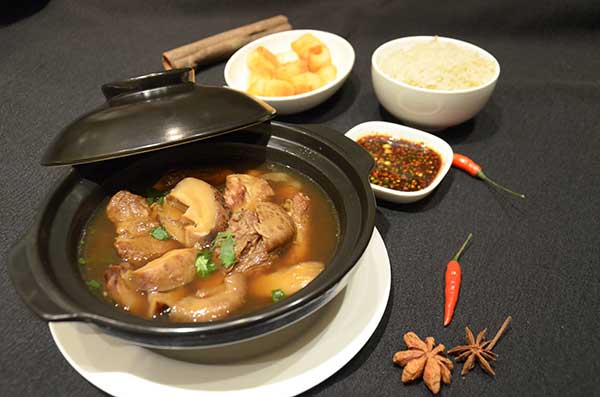
Klang style bah kut teh, a porkrib dish cooked in broth, is JW Marriott Beijing Central's signature dish.(Photo provided to China Daily)
"The simple is the best," Eric Hong says of the South Asian dinner menu he's just developed to go along with the JW Marriott Beijing Central's popular buffet. At JW Kitchen, his healthy yet unsophisticated delicacies include Vietnamese spring roll, tom yum soup, and Klang style bah kut teh - literally "meat bone tea", a pork-rib dish cooked in broth.
A Chinese-Malaysian born in George Town, Malaysia, the hotel's newly appointed executive chef has more than 20 years' culinary experience in globally recognized hotels across Asia. His Chinese origin, international education and work experience has fed a fierce passion for Chinese culture and fusion of Western and Asian fares, he says.
The bah kut teh was a favorite at our table when I dined at the restaurant the other day. Despite its name, there is no tea in the dish's ingredients. Very popular in Malaysia and Singapore, the dish is often served with rice or youtiao (deep-fried breadstick).
Unlike the traditional bah kut teh that is savory and has a predominantly meaty flavor, Hong's version has a sweet aftertaste in the refreshingly smooth and savory soup.
"The secret is simmering simple but high-quality ingredients very patiently," Hong says.
All the herbs and spices he uses are imported for the best quality, and it takes seven to eight hours to simmer the broth, he adds.
The origin of dish is associated with Chinese labor working in seaports, according to Hong. In the past, many Chinese people went to South Asian countries in pursuit of a better life, starting as porters. Having little money for food, but badly in need of good nutrition due to their physically challenging jobs, they created the dish. They simmered meaty pork ribs in broth with many inexpensive Chinese medicine ingredients and spices that are believed to replenish qi, or life force, such as Chinese angelica, star anise, cinnamon and cloves, Hong says.
The mixed appetizer included homemade samosa with chicken and potato, served with mint raita, roasted eggplant marinated with hot-and-sour fish sauce, cumin and coriander, and Vietnamese spring roll with lettuce, bean sprouts, boiled prawn, and mint sauce, combining three flavors harmoniously in one plate.
While the roasted eggplant tasted appetizingly sour and very spicy, the samosa was crunchy, aromatic and a little spicy, and the spring roll was refreshingly light-flavored and had bite.
The phad Thai, or wok-fried rice noodle with prawn, beansprout, chives, egg and bean curd, and the durian cheese cake are also must-tries, because they feature ingredients that are freshest in winter.
If you go
6 am-11 pm, 4/F, JW Marriott Beijing Central, 18 Xuanwumen Waidajie, Xicheng district, Beijing. 010-6391-6391.


















































